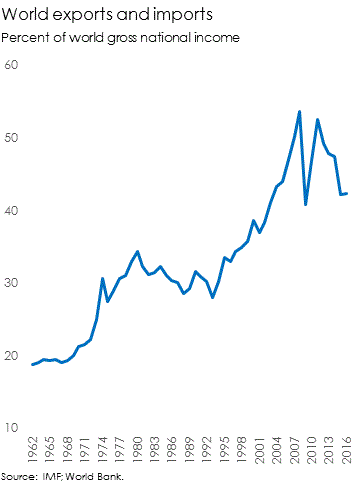Globalisation under threat
Conference——Reinventing Bretton Woods Committee and Hamburg Institute of International Economics
8 July 2017
The G20 summit in Hamburg on 7-8 July is to celebrate globalisation. Yet there is mounting concern that globalisation has peaked. Reinventing Bretton Woods Committee and Hamburg Institute of International Economics organised a conference ahead of the G20 with academics, private sector participants and G20 and other officials to reflect on the threat from de-globalisation. Herein is a summary of the views expressed during the conference:1
Globalisation has not been a linear process. The rise of globalisation during the nineteenth century saw its first important reversal with the adoption of higher trade tariffs by Germany towards the end of the 1870s. The Great Depression in 1929-33 was accompanied by a severe contraction of international trade and capital flows. The post-World War II order successfully restored conditions for another wave of globalisation through the beginning of the Great Recession in 2008. Since 2008, international trade and capital flows have declined relative to world output (Chart).

The gains from globalisation have been considerable. Export-led economic growth in many countries has brought considerable rises in living standards. Capital flows have distributed financial resources across countries promoting local investments. The diffusion of new technology has allowed relocation and de-localisation of knowledge creating new employment opportunities and build-up of human capital. Looking forward, technology may shape globalisation more than trade and financial flows amid its transformation of locality, scale and output processes.
Yet, declining productivity levels accompanied by excessive debt in some countries and rising uncertainty also due to technology disruptions, that is the risk of investing in the wrong technology, may reduce scope for globalisation. This uncertainty is also reflected in a decline in long-term broad money velocity. The productivity gains from new technologies have remained small and productivity growth is seen as highly and increasingly skewed towards a few firms giving rise to adverse distributive impacts.
At the same time, globalisation has been associated with inherent instability amid contagion, polarisation of income distribution and emergence of apparent antagonistic powers. In the Western world, disappointment with elites amid perceived rising inequality has given rise to populism and political polarisation. The political far-right has benefited disproportionately amid its rhetoric of anti-elitism and authoritarianism. At the same time, recent crises in the U.S. can be considered mostly home-made amid significant policy errors in housing and bank resolution.
Economists are being accused of being good at promoting free trade but bad at fostering distribution. The top percentile of the population has gained in several countries an overwhelming share of total income gains resulting also in rising wealth inequality. It also suggests that the cost of redistribution has increased. However, the debate seems focused mostly on relative income levels. Absolute income levels have been rising significantly lifting many people out of absolute poverty and into higher absolute income percentiles. The importance of relative and absolute income levels shapes the debate about additional income opportunities through globalisation. At the same time, where rising discontent risks constraining globalisation, domestic policies need to adjust to offer fair compensation and support transitions due to expected structural changes.
The high level of globalisation may indicate that the additional gains from globalisation are small. At the aggregate, total exports and imports representing about 44 percent of world GDP, may be limited amid actual proportions of tradable to non-tradable goods and services. It may also suggest that there may be an optimal level of globalisation. Differences in economic development across countries underline that most countries may perceive their potential gains from globalisation differently from other countries. It also implies that most countries, believing in the gains from globalisation as they remain far from the economic development frontier, would still be considerable.
China emerged as a key promoter of globalisation and is now a net capital exporting country. The Belt and Road constitutes the largest infrastructure development initiative since the Marshall Plan. The emergence of China’s capital markets constitutes a new pool of financial savings that already are among the largest in the world. China’s push for renminbi internationalisation supports financial diversification and opportunity to shift away from reliance on the dollar to manage international liquidity and settle international payments. It would allow to bring globalisation also to the international monetary system that has remained one of the least globalised domains of the world economy. This may help promote a needed more elastic supply of safe assets.
The sustainability of globalisation will depend on ensuring that globalisation is perceived as fair. Perception will differ across countries. A YouGov poll in 19 countries of 2016 of whether globalisation is a force of good or bad for the world showed that most thought globalisation was a force for good by a wide margin. Yet, rising protectionist measures today mostly linked to export direct or indirect subsidies and through tax schemes are seen as eroding the basis for globalisation and may produce rising tensions around global trade and investment rules.
Globalisation has supported most countries to become more prosperous. It seems difficult to imagine that comparable income gains across the world would have been possible without globalisation. After World War II, there was consensus that the restoration of international trade was one of the most urgent objectives of the post-war international order to secure rising employment and real incomes. This consensus now seems in doubt. Those who believe that further gains are outweighed by potential costs, that is, some of the rich countries, may resist sustaining openness. Those who believe that there is considerable room left to improve prosperity, that is, most of the world, will insist that globalisation needs to stay.
1 Based on my own views and participants' comments made on day 1 of the conference only.